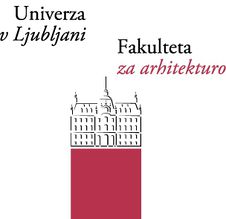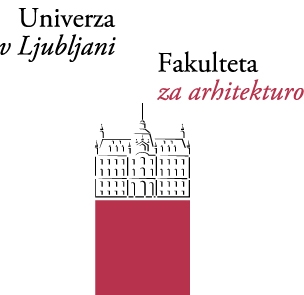Difference between revisions of "Faculty of Architecture, University of Ljubljana"
Anže Zorman (talk | contribs) |
|||
| Line 7: | Line 7: | ||
| name = Faculty of Architecture, University of Ljubljana | | name = Faculty of Architecture, University of Ljubljana | ||
| local name = Fakulteta za arhitekturo, Univerza v Ljubljani | | local name = Fakulteta za arhitekturo, Univerza v Ljubljani | ||
| + | | logo = Faculty of Architecture University of Ljubljana (logo).JPG | ||
| street = Zoisova c. 12 | | street = Zoisova c. 12 | ||
| town = SI-1000 Ljubljana | | town = SI-1000 Ljubljana | ||
Revision as of 13:26, 3 November 2016
-
8 Dec 2021
The soft opening of the Europe Readr installation will take place at the seminar organized by the East Asia Resource Library (EARL), University of Ljubljana, and the Institute of European Studies, Chinese Academy of Social Sciences (CASS). The project was initiated by the Ministry of Foreign and European Affairs on the occasion of the Slovenian Presidency of the Council of the European Union. Partners and co-organisers are EU Delegation (EUDEL) Beijing, EUNIC cluster Beijing, Faculty of Architecture, University of Ljubljana, Embassy of the Republic of Slovenia Beijing, Embassies of Austria, Hungary, Spain, and Portugal, and Tsinghua University, Kunming University of Science and Technology, and Yunnan local community.
-
to
18 Jun 2015
28 Jun 2015
Meta Grgurevič, JAŠA as set designers and Ana Savić Gecan, costume designer, selected by Barbara Novakovič Kolenc, and students of the Faculty of Architecture, University of Ljubljana and Academy of Theatre, Radio, Film and Television (AGRFT) presented at the Prague Quadrennial of Performance Design and Space (PG). Produced by Slovenian Theatre Institute and Muzeum Institute, in cooperation with Slovene National Theatre Drama Ljubljana and Slovene National Theatre Opera and Ballet Ljubljana, supported by the Embassy of the Republic of Slovenia Prague
-
4 Nov 2014
A lecture on Edvard Ravnikar by Professor Aleš Vodopivec, Faculty of Architecture, University of Ljubljana, at Architectural Tuesdays – Slovenia
-
to
17 Jan 2014
8 Feb 2014
The Links, an exhibition of unique wood designs by Klara Zalokar and Klemen Zupančič (Handmade in Moste), OLoOP Design, Dejan Pfeifer (Studio Drevo), Tobias Putrih, Samo Gašperšič, Arne Vehovar, Nena Gabrovec and, Kaja Lipnik Vehovar, as well as the students of the Faculty of Architecture, University of Ljubljana and Faculty of Social Sciences, University of Ljubljana,
-
to
13 Jan 2014
23 Jan 2014
The exhibition X – Territorial: Slovenian Embassy in Israel - Israeli Embassy in Slovenia, featuring architectural designs for both embassies, made in cooperation with the Faculty of Architecture of WIZO Haifa Academy of Design and Education and the Faculty of Architecture, University of Ljubljana, Vasa Perović (Bevk Perović Arhitekti) and Jure Grohar, supported by the Embassy of the Republic of Slovenia Tel Aviv,
-
to
25 Nov 2013
13 Dec 2013
A photo exhibition Plečnik's Žale and a colloquium about his work featuring a lecture by Peter Krečič, and a visit by the Faculty of Architecture, University of Ljubljana and Obalne galerije - Coastal Galleries, supported by the Embassy of the Republic of Slovenia Paris and Consulate of the Republic of Slovenia St. Etienne,
-
to
11 Apr 2013
25 Apr 2013
An exhibition of innovative architectural projects by Lučka Ažman Momirski (Faculty of Architecture, University of Ljubljana) and Marco Venturi
Studies
In the academic year 2007/08 the Faculty of Architecture introduced new Bachelors and Master courses based on the Bologna declaration. The new doctoral programme in architecture started in 2009/10. The faculty employs more than 50 university teachers and associates; some of the younger teachers have completed postgraduate studies abroad. Intensive international exchange of students has also been introduced. Each academic year two foreign teachers work at the faculty as visiting professors. Graduates of the faculty are experts who are able to adjust to changing conditions and various tasks, including design of objects and interiors, projecting of buildings and planning of large town units, landscape architecture, and regional planning.
Single masters study programme Architecture
The single masters study programme Architecture takes 5 years (10 semesters) and amounts to 300 credit points. The study programme includes elective modules A and B. The basic goal is to train experts for responsible tasks concerning architectural design and planning, as well as spatial management. The professional title bestowed on the graduate is "Master engineer of architecture (mag. eng. arch.)".
Doctoral study programme in Architecture
The doctoral study programme in Architecture lasts 3 years (6 semesters) and is comprised of a total 180 ECTS–credits. The study programme includes 60 ECTS–credits in organised study form, and 120 ECTS–credits of individual research work. The programme trains the independent scientific researcher in the widest problem area of architectural issues, demonstrating responsibility towards the cultural region and excellence at an international level. The scientific title acquired by doctoral students in the field of architecture is Doctor of Science (Dr).
Facilities
Facilities include a study centre, a library, a model workshop, and numerous student workplaces. A specialised library offers 22,000 titles with a great selection of recent books on architecture, construction, planning, design, art, and related themes, and an extensive collection of contemporary international magazines. Since 2009 the Light Laboratory has been operating in the basement of the new building of the Faculty of Architecture. This important contribution has offered the opportunity to explore the phenomenon of light in an isolated laboratory space, and to create different ambient lighting conditions, and then implementing them in architecture and planning.
History
The Faculty of Architecture originated in 1919 as the Department of Architecture, at first as a two–year course, that later evolved into a four–year study. In its current formation the study of architecture was established in 1957 as the constituent part of the University of Ljubljana – in the post-war period the Department of Architecture was for many years part of the Faculty of Architecture, Civil Engineering and Geodesy, with the exception of a short period between 1950–1954 when it was independent within the framework of the Technical Faculties. At the outset, the school's artistic orientation was determined in the Middle European tradition and personified by Schinkel, Semper, and Wagner. Jože Plečnik and Ivan Vurnik were successors to this tradition, followed from the 1950s to the 1980s by Professors Edo Ravnikar and Edo Mihevc.
The separate Faculty of Architecture was established in 1995 due to high interest, very efficient studies, and an unusually wide range of areas in which architecture graduates can work successfully. The number of degrees that had been awarded by the faculty up to the year 2000 was close to 3,000. It currently turns out some 100 students every year. Developments in computer science, psychology, and production organisation are now enabling the expansion of activities to new architectural areas.
International cooperation
From 2005–2008 the project ALPTER outlined the problem of the abandonment of terraced agricultural areas in the alpine region. Co-financed in the framework of the EU programme Interreg Alpine Space, the initiative was developed in partnership with numerous institutions and associations coming from different sectors which share a common interest in terracements.
In 2009 the Faculty of Architecture joined the international network of European architectural faculties for the South Africa Ithuba Project – in 2010 a group of students under professional guidance will build a school in Johannesburg, the Republic of South Africa.
In 2011 the faculty will host the international conference eCAADe (Education and Research in Computer Aided Architectural Design in Europe), accompanied by a workshop. The main topics of the conference are the recognition, development, and encouragement of virtual space.
The Faculty of Architecture is also a member of the Erasmus exchange programme for European students, connecting youth from all over Europe, exchanging knowledge, skills, and forming new connections.
Student activities
Different student groups operate under the Faculty of Architecture. The Student Council members are legal representatives of views and interests of all students and the faculty of the University in Ljubljana. The ŠOFA is part of the Student Organisation of the University of Ljubljana, operating at the Faculty of Architecture; its student members are entitled to financial resources to help arrange a wide scope of extra–curricular activities.
The Slovenian National Committee of the non–profit organisation EASA (European Architecture Student Assembly) also operates at the Faculty, organising several international workshops and meetings. In addition, two-week camps (organised by students of architecture for students of architecture) take place each summer in a different country at the partner faculties abroad.
See also
- Faculty of Architecture Library, University of Ljubljana
- Magazine AR Architecture, Research
- South Africa Ithuba Project
External links
- Faculty of Architecture, University of Ljubljana website (in Slovenian and some English)
- Graduate and postgraduate programmes, 2010 (pdf in English, also available in Slovenian)
- Doctoral study programme 2010-11 (pdf in English, also available in Slovenian)
International projects and networks




